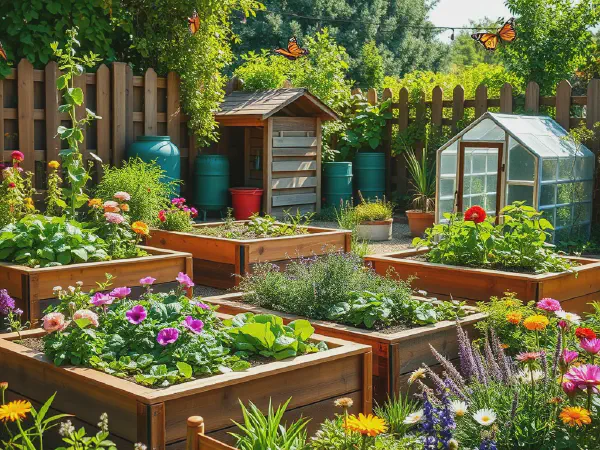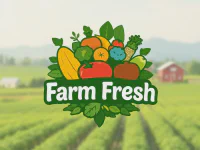Top Sustainable Farming Practices Tips for Home Gardens

Sustainable Farming Practices Tips for Home Gardens
Sustainable farming practices are essential for nurturing our environment while providing food for ourselves and our families. If you're starting or improving your home garden, leveraging sustainable farming practices can enhance the health of your garden, the soil, and the wider ecosystem. In this article, we will explore various tips and techniques that embody sustainable farming practices, focusing specifically on home gardens.
First and foremost, understanding the principles of organic gardening techniques is fundamental in sustainable farming practices tips for home gardens. Organic gardening does not involve synthetic fertilizers or pesticides but instead focuses on natural methods of cultivation. This ensures that the food produced is free from harmful chemicals and benefits the environment. By implementing organic gardening techniques, gardeners can harvest healthy produce while supporting biodiversity and soil health.
In addition to organic gardening, water conservation is a key element in sustainable farming practices. With climate change affecting weather patterns, it's imperative to use water wisely, ensuring every drop counts. Implementing water conservation methods in your home garden can lead to reduced waste and a flourishing garden. These practices are not only eco-friendly, but they can significantly lower your water bill as well.
Biodiversity in home gardens plays a crucial role in maintaining a balanced ecosystem. By planting a diverse array of species, you can create a thriving habitat that supports beneficial insects and wildlife. This diversity also lends resilience to your garden, making it less susceptible to pests and diseases. In this article, we’ll discuss how enhancing biodiversity through careful planning can yield greater rewards for your gardening efforts.
Finally, managing soil health is perhaps one of the most significant sustainable farming practices. Healthy soil is a foundation for productive gardening. By focusing on soil health management, gardeners can build robust ecosystems right in their backyards. Understanding the components of soil and integrating practices that promote its health will not only improve crop yield but also contribute to ecological balance. Let's dive deeper into these sustainable farming practices tips for home gardens.
Organic Gardening Techniques
Companion planting is an effective organic gardening technique favored by many home gardeners. This method involves planting specific crops in proximity to one another to naturally deter pests and boost growth. For example, marigolds planted alongside vegetables can repel harmful insects, while herbs such as basil can enrich the flavor of tomatoes when planted nearby. Using companion planting techniques can reduce the need for synthetic pesticides, contributing to a healthier garden.
Another key aspect of organic gardening is the use of organic fertilizers and compost. Composting kitchen scraps and garden waste can create nutrient-rich organic matter that enhances soil structure and fertility. Organic fertilizers, such as bone meal and fish emulsion, are preferable to their synthetic counterparts as they feed plants in alignment with nature's cycles. Together, these practices help maintain the ecological balance of your garden while providing necessary nutrients to your plants.
Crop rotation is another beneficial organic gardening technique that promotes soil health. By rotating crops seasonally, gardeners can prevent soil depletion, minimize pest accumulation, and reduce the risk of plant diseases. This practice allows specific nutrients to replenish naturally in the soil as different plants have unique nutrient requirements. For instance, following nitrogen-fixing legumes, such as peas or beans, with heavy feeders like corn can lead to a more productive garden.
Mulching is an essential technique in organic gardening that offers myriad benefits. Applying a layer of organic mulch—such as straw, wood chips, or leaves—conserves moisture by reducing evaporation, suppresses weed growth, and improves soil health as it decomposes. By retaining moisture and regulating soil temperature, mulching can make a noticeable difference in the growth of your plants, ultimately leading to a more sustainable garden.
Water Conservation Methods
Drip irrigation systems are an efficient way to conserve water in your home garden. This method delivers water directly to the base of the plants, minimizing evaporation and runoff. By using a timer or smart irrigation controllers, you can optimize water usage, ensuring your garden receives just what it needs—no more and no less. Implementing a drip irrigation system not only conserves water but also promotes healthier plant growth.
Rainwater harvesting is another excellent practice for conserving water in home gardens. By collecting rainwater from rooftops or patios in barrels, gardeners can utilize this natural resource for watering plants instead of relying solely on municipal water supplies. This sustainable method not only helps save water but also reduces your environmental footprint by lowering the demand on city water systems.
Soil moisture management practices, such as checking and adjusting soil hydration levels regularly, can greatly enhance water conservation in gardens. Techniques such as using moisture meters, observing plant responses to dryness, and practicing deep watering instead of frequent shallow watering can ensure optimal hydration. A well-managed soil moisture level keeps plants healthy, reduces water waste, and provides a sustainable gardening practice.
Choosing drought-resistant plants is a strategic approach in sustainable gardening that can help reduce water usage significantly. By selecting native or drought-tolerant species, you can cultivate a garden that thrives in your local climate with minimal irrigation needs. Not only do these plants require less water, but they also support local wildlife and promote biodiversity.
Biodiversity in Home Gardens
Planting native species is a critical way to enhance biodiversity in home gardens. Native plants have adapted to local climates and soil types, making them more resilient and easier to maintain. They provide crucial habitats for pollinators and beneficial insects, increase habitat diversity, and support local ecosystems. By incorporating native species into your garden, you bolster ecological integrity while enjoying the beauty of local flora.
Creating habitats for beneficial insects is essential for promoting biodiversity. Consider adding features such as insect hotels, water sources, and diverse plantings that attract bees, butterflies, and ladybugs. These insects play vital roles in pollination and pest control, making your garden more vibrant and productive. By fostering a safe and welcoming environment for beneficial insects, you ensure your garden thrives with nature's help.
Permaculture principles can provide invaluable insights into achieving biodiversity in home gardens. By designing your garden to mimic natural ecosystems, you can enhance yield while maintaining harmony with the environment. Practices such as layering plants, using guilds of companion species, and integrating animals can create microclimates and enrich biodiversity. These systems allow for self-sustaining gardens that align with ecological patterns.
Intercropping is another effective practice to enhance resilience in home gardens. By growing multiple crops in close proximity, gardeners can minimize competition, reduce pest incidence, and improve productivity. For example, planting taller crops, like corn, alongside shorter ones, such as beans, allows for more efficient use of sunshine and space. This diverse planting practice boosts overall garden health and increases resilience against climate challenges.
Soil Health Management
Building healthy soil with composting is a fundamental principle of sustainable farming practices. A thriving garden relies on nutrient-rich soil, and composting is one of the best ways to achieve this. By recycling organic matter, you enrich the soil with essential nutrients, improve drainage, and enhance microbial activity. Healthy soil contributes to higher yields and better disease resistance in your plants.
Understanding soil pH and nutrients is crucial for successful gardening. Testing your soil can help you make informed decisions about amendments needed to optimize growing conditions. Different plants thrive at different pH levels, and knowing your soil's nutrient profile allows you to adjust accordingly. By managing soil composition, you can create an environment where plants can flourish sustainably.
The benefits of cover cropping cannot be overstated in healthy soil management. Planting cover crops, such as clover or rye, during the off-season prevents erosion, suppresses weeds, and enhances soil structure. When these crops decompose, they add organic matter and nutrients back into the soil. Utilizing cover crops is a great practice for sustainable gardening that provides various ecological benefits.
Earthworms play a pivotal role in soil fertility and health. These beneficial organisms aerate the soil, break down organic matter, and enhance nutrient availability for plants. By fostering an environment where earthworms can thrive—through practices like minimal tillage and organic matter addition—gardeners promote a robust soil ecosystem that supports plant growth sustainably.
Organic Pest Management
Natural predators and pest-repellent plants are key pillars effective practices in organic pest management. Introducing beneficial insects like ladybugs and lacewings into your garden can naturally control pest populations. Additionally, planting garlic or marigolds can deter specific pests, reducing the need for chemical interventions. By cultivating a balanced garden ecosystem, you can manage pests sustainably without harmful chemicals.
DIY organic pest solutions, such as homemade sprays and traps, can effectively control pest issues without relying on synthetic pesticides. Ingredients like soap, vinegar, and essential oils can be combined to create effective pest repellents that are safe for your garden and the environment. Taking a proactive approach to pest management enables gardeners to maintain a healthy and productive garden sustainably.
The importance of healthy plant ecosystems cannot be overstated. Maintaining diverse, resilient plant communities naturally reduces the chances of pest outbreaks. By avoiding monocultures and emphasizing variety in plantings, gardeners can create environments where plants support each other, balancing out natural pest populations. This approach is vital for developing sustainable gardens that thrive without heavy chemical use.
Integrated Pest Management (IPM) practices offer a comprehensive approach to addressing pest challenges sustainably. By combining cultural, mechanical, biological, and chemical methods when necessary, gardeners can manage pest populations effectively while minimizing risks to human health and the environment. IPM emphasizes preventative measures and monitoring, enabling a targeted, eco-friendly approach to sustainable pest management.
